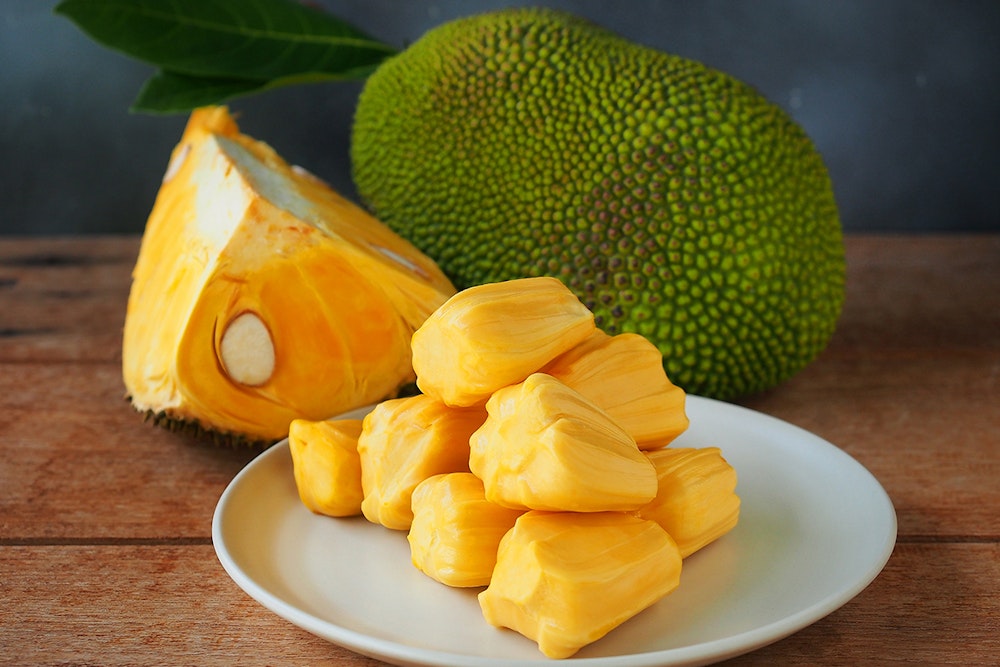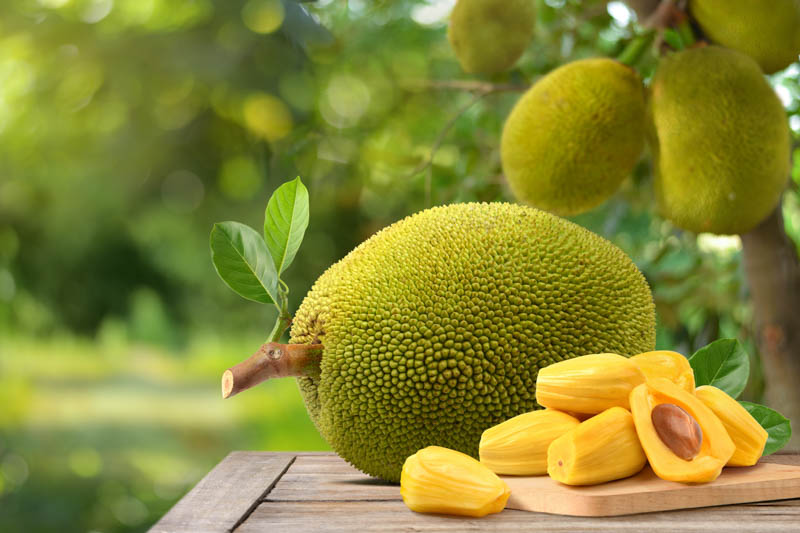JAKARTA, studyinca.ac.id – Jackfruit can weigh up to 80 pounds and reach lengths of up to three feet. Beyond its impressive size, jackfruit is steeped in local wisdom and cultural significance, leading to many myths and beliefs surrounding its cultivation, consumption, and health benefits. In this article, we will explore some common myths about jackfruit while emphasizing the importance of knowledge in understanding this fascinating fruit.
The Cultural Significance of Jackfruit

Before delving into the myths, it’s essential to recognize the cultural significance of jackfruit in various regions. In countries like India, Bangladesh, and Thailand, jackfruit is not just a food source; it holds a prominent place in local traditions and cuisines. In many cultures, jackfruit is celebrated for its nutritional value and versatility, often used in both sweet and savory dishes. For instance, unripe jackfruit is commonly used as a meat substitute in vegetarian and vegan recipes due to its fibrous texture.
The knowledge embedded in local traditions regarding jackfruit cultivation and preparation has been passed down through generations. However, as with many traditional beliefs, myths have also emerged, leading to misconceptions about this giant fruit.
Common Myths About Jackfruit
Myth 1: Jackfruit Is Only for Vegans and Vegetarians
One prevalent myth is that jackfruit is exclusively a food for vegans and vegetarians. While it is indeed a popular meat substitute due to its texture and ability to absorb flavors, jackfruit is enjoyed by people of all dietary preferences. Many cultures incorporate jackfruit into traditional dishes that are not vegetarian, showcasing its versatility.
Knowledge Insight: Understanding the culinary applications of jackfruit can help dispel this myth. It can be used in curries, desserts, salads, and even grilled dishes, making it a valuable addition to any diet.
Myth 2: Eating Jackfruit Causes Weight Gain
Another common belief is that jackfruit is fattening and should be avoided by those looking to lose weight. While jackfruit does contain carbohydrates, it is low in calories compared to many other fruits. A typical serving of jackfruit provides essential nutrients, including vitamins A and C, potassium, and dietary fiber, which can aid in digestion and promote a feeling of fullness.
Knowledge Insight: The nutritional profile of jackfruit indicates that it can be part of a balanced diet. Incorporating it into meals can provide health benefits without contributing to excessive calorie intake.
Myth 3: Jackfruit Seeds Are Toxic
Some people believe that the seeds of jackfruit are toxic and should not be consumed. In reality, jackfruit seeds are not only safe to eat but also nutritious. They are rich in protein, vitamins, and minerals. In many cultures, jackfruit seeds are boiled or roasted and enjoyed as a snack or added to dishes for added nutrition.
Knowledge Insight: Understanding the culinary uses of jackfruit seeds can enhance one’s appreciation for the entire fruit. They can be ground into flour, used in soups, or even made into snacks, showcasing their versatility.
Myth 4: Jackfruit Should Only Be Eaten When Fully Ripe
While ripe jackfruit is deliciously sweet and fragrant, there is a prevalent myth that it should only be consumed when fully ripe. In fact, unripe jackfruit is commonly used in savory dishes and is a staple in many cuisines. The texture of unripe jackfruit makes it an excellent base for curries, stir-fries, and other savory preparations.
Knowledge Insight: Knowing how to select and prepare both ripe and unripe jackfruit can expand culinary options. Each stage of ripeness offers unique flavors and textures, allowing for diverse cooking applications.
Myth 5: Jackfruit Is Hard to Prepare
Many people shy away from jackfruit due to the belief that it is difficult to prepare. While it is true that jackfruit can be challenging to cut due to its size and sticky sap, with the right techniques, it can be easily handled. Using oil on your hands and knife can help prevent the sap from sticking, making the preparation process smoother.
Knowledge Insight: Familiarizing oneself with preparation techniques can demystify the process. Online tutorials and local cooking classes can provide valuable insights into how to handle and cook jackfruit effectively.
The Health Benefits of Jackfruit
Beyond the myths, it’s essential to highlight the numerous health benefits associated with jackfruit. This giant fruit is a powerhouse of nutrients that can contribute to overall well-being. Here are some notable health benefits:
- Jackfruit is packed with vitamins and minerals like vitamin C, vitamin A, potassium, and magnesium. These nutrients are great for boosting your immune system, keeping your skin healthy, and helping your body function properly.
- Jackfruit is high in dietary fiber, which aids digestion and helps regulate blood sugar levels. A fiber-rich diet is associated with reduced risk of chronic diseases, including heart disease and type 2 diabetes.
- Jackfruit contains antioxidants that help combat oxidative stress and inflammation in the body. This can contribute to overall health and may reduce the risk of chronic diseases.
- The potassium content in jackfruit can help regulate blood pressure levels, promoting cardiovascular health. Additionally, the fiber in jackfruit can help lower cholesterol levels, further supporting heart health.
- Jackfruit is a great energy booster thanks to its carbs, which give you a quick pick-me-up — perfect for athletes or anyone with an active lifestyle.
Knowledge Insight: Understanding the health benefits of jackfruit can encourage individuals to incorporate it into their diets, dispelling myths about its nutritional value.
Cultivating Jackfruit: Local Wisdom and Practices
Jackfruit cultivation is not just a matter of planting seeds and waiting for fruit to develop; it involves a deep understanding of local agricultural practices and environmental conditions. Farmers often rely on traditional knowledge passed down through generations, which informs their cultivation techniques.
Soil and Climate Requirements
Jackfruit trees thrive in tropical and subtropical climates, requiring well-drained soil rich in organic matter. Local wisdom often emphasizes the importance of soil health, with farmers using natural fertilizers and compost to enrich the soil. Understanding the specific soil requirements and adapting cultivation practices to local conditions is crucial for successful jackfruit farming.
Pest Management
Local wisdom also plays a significant role in pest management. Many farmers use traditional methods to control pests, such as planting companion crops that deter harmful insects or using natural remedies made from local plants. This knowledge not only helps protect the jackfruit trees but also promotes sustainable farming practices.
Harvesting Techniques
The timing of jackfruit harvesting is critical for optimal flavor and texture. Local farmers often rely on their experience and knowledge of seasonal changes to determine the best time to harvest. Observing the fruit’s size, color, and aroma can guide farmers in making informed decisions about when to pick.
Conclusion
Jackfruit is a remarkable fruit with a rich cultural heritage and numerous health benefits. While myths and misconceptions surround this giant fruit, gaining knowledge about its nutritional value, culinary uses, and cultivation practices can help dispel these myths. By embracing local wisdom and understanding the science behind jackfruit cultivation, individuals can appreciate this superfruit’s versatility and significance.
As awareness of jackfruit continues to grow, it is essential to share knowledge and educate others about its benefits and uses. Whether enjoyed in savory dishes, sweet desserts, or as a nutritious snack, jackfruit has much to offer. By breaking down myths and promoting understanding, we can ensure that this extraordinary fruit receives the recognition it deserves in global cuisine.

